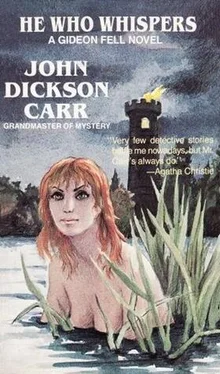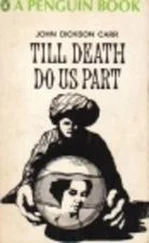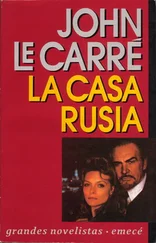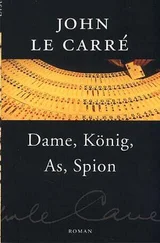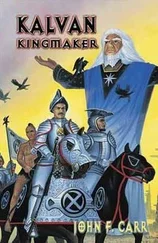“Certain matters? About--?”
“About those two crimes,” said Dr. Fell. He peered at Barbara as though noticing her for the first time. “Oh, ah!” breathed Dr. Fell with an air of enlightenment. “And you must be Miss Morell!”
“Yes! I want to apologize . . .”
“Tut, tut! Not for the famous fiasco of the Murder Club?”
“Well . . . yes.”
“A small matter,” said Dr. Fell, with a massive gesture of dismissal.
He lumbered to the frayed armchair, which had been pushed near one window. With the aid of his crutch-handled stick he sat down, the armchair accommodating him as best it could. After rolling back his shaggy head to take a reflective survey of Barbara, of Miles, an of Professor Rigaud, he reached into his inside breast pocket under the cape. From this he produced Professor Rigaud's sheaf of manuscript, now much crumpled and frayed at the edges.
And he produced something else which Miles recognized. It was the coloured photograph of Fay Seton, last seen by Miles at Beltring's Restaurant. With the same air of ferocity overlying bitter worry and distress, Dr. Fell sat studying the photograph.
“Dr. Fell,” said Miles. “Hold on! Half a minute!”
The doctor rolled up his head.
“Eh? Yes? What is it?”
“I suppose Superintendent Hadley's told you what happened in this room a couple of hours ago?”
“H'mf, yes. He's told me.”
“Barbara and I came in here and found Fay standing where Barbara is now, with the brief-case and a bundle of blood-stained banknotes. I—er--shoved those notes into my pocket just before Hadley arrived. I needn't have bothered. After asking a lot of questions which seemed to tend towards Fay's guilt, he showed he knew about the brief-case all along.”
Dr. Fell frowned. “Well?”
“At the height of the questioning, this light went out. Somebody must have thrown the main-switch in the fuse-box just outside in the passage. Someone or something rushed in here . . .”
“Someone,” repeated Dr. Fell, “or something. By thunder, I like the choice of words!”
“Whoever it was, it threw Fay to one side and ran out of here with the brief-case. We didn't see anything. I picked up the brief-case outside a minute later. It had nothing in it but the three other packets of notes and a little gritty dust. Hadley took the whole lot away with him, including my concealed notes, when he left with Fay in the –in the ambulance.
Miles gritted his teeth.
“I mention all this,” he went on, “because so many hints have been made about her guilt that I'd like to see justice done in one respect. Whatever reason you had for asking me, Dr. Fell, you did ask me to get in touch with Barbara Morell. And I did, with sensational results.”
“Ah!” murmured Dr. Fell in a vaguely distressed way. He would not meet Miles' eyes.
“Did you know, for instance, that it was Harry Brooke who wrote a series of anonymous letters accusing Fay of having affairs with men all over the district? And then, when that charge fell flat, Harry stirred up superstition by bribing young Fresnac to slash marks in his own neck and start this nonsense about vampirism? Did you know that?”
“Yes,” assented Dr. Fell. “I know it. It's true enough.”
“We have here”--Miles gestured to Barbara, who opened her handbag--”a letter written by Harry Brooke on the very afternoon of the murder. He wrote it to Barbara's brother, who,” Miles added hastily, “isn't at all concerned in this. If you still have any doubts . . .”
Dr. Fell reared up his shoulders with sudden acute interest.
“You have that letter?” he demanded. “May I see it?”
“With pleasure. Barbara?”
Rather reluctantly, Miles thought, Barbara handed over the letter. Dr. Fell took it, adjusted his eyeglasses, and slowly read it through. His expression had grown even more lowering when he put it down on one knee on top of the manuscript and the photograph.
“It's a pretty story, isn't it?” Miles asked bitterly. “A very fine thing to hound her with! But let's leave Harry's ethics out of this, if nobody gives a curse about Fay's side of it. The point is, this whole situation came about through a trick played by Harry Brooke . . .”
“No!” said Dr. Fell in a voice like a pistol-shot.
Miles stared at him.
“What do you mean by that?” Miles demanded. “You're not saying that Pierre Fresnac and this grotesque charge of vampirism--?”
“Oh, no,” said Dr. Fell, shaking his head. “We may leave young Fresnac and the manufactured teeth-marks entirely out of the picture. They are irrelevant. They don't count. But . . .”
“But what?”
Dr. Fell, after contemplating the floor, slowly raised his head and looked Miles in the eyes.
“Harry Brooke,” he said, “wrote a lot of anonymous letters containing accusations in which he didn't believe. That is the irony! That is the tragedy! For, although Harry Brooke didn't know it—didn't dream of it, wouldn't have believed it if you'd told him—the accusations were nevertheless perfectly true.”
Silence.
A silence which stretched out unendurably . . .
Barbara Morell put her hand softly on Miles' arm. It seemed to Miles that between Dr. Fell and Barbara flashed a glance of understanding. But he wanted time to assimilate the meaning of those words.
“Behold now,” said Dr. Fell, rounding the syllables with thunderous emphasis, “an explanation which presently will fit so many puzzling factors in this affair. Fay Seton had to have men. I wish to put this matter with delicacy, so I will merely refer you to the psychologist. But is is a form of psychic illness which has tortured her since youth.
“She is no more to be blamed for it than for the heart-weakness which accompanied it. In women so constituted—there are not a great number of them, but they do appear in consulting-rooms—the result does not always end in actual disaster. But Fay Seton (don't you see?) was emotionally the wrong kind of woman to have this quirk in her nature. Her outward Puritanism, her fastidiousness, hr delicacy, her gentle manners, were not assumed. They are real. To have relations with casual strangers was and is torture to her.
“When she went out to France as Howard Brooke's secretary in nineteen-thirty-nine, she was resolved to conquer this. She would: she would, she would! Her behaviour as Chartres was irreproachable. And then . . .”
Dr. Fell paused.
Again he took up the photograph and studied it.
“Do you begin to understand now? The atmosphere which always surrounded her was an air of . . . well, look into your own memory! It went with her. It haunted her. It clung round her. That was the quality which touched and troubled everywhere the people with whom sh came in contact, even though they did not understand it. It was a quality sensed by nearly all men. It was a quality sensed, and bitterly resented, by nearly all women.
“Think of Georgina Brooke! Think of Marion Hammond! Think of . . .” Dr. Fell broke off, and blinked at Barbara. “I believe you met her a while ago, ma'am?”
Barbara made a helpless gesture.
“I only met Fay for a very few minutes!” she protested quickly. “How on earth could I tell anything? Of course not! I . . .”
“Will you think again, ma'am?” said Dr. Fell gently.
“Besides,” said Barbara, “I liked her!”
And Barbara turned away.
Dr. Fell tapped the photograph. The pictured eyes-with their faint irony, their bitterness under the far-away expression—made Fay Seton's presence live and move in this room as strongly as the discarded handbag still on the chest-of-drawers, or the fallen identity card, or the black beret on the bed.
“That is the figure, good-natured an well-meaning, we must see walking in bewilderment—or apparent bewilderment—through the events that follow.” Dr. Fell's big voice was raised. “Two crimes were committed. Both of them were the work of the same criminal . . .”
Читать дальше
